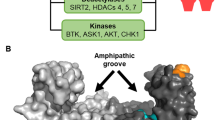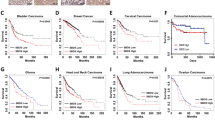Abstract
As a major negative regulator of p53, the MDM2 oncogene plays an important role in carcinogenesis and tumor progression. MDM2 promotes p53 proteasomal degradation and negatively regulates p53 function. The mechanisms by which the MDM2–p53 interaction is regulated are not fully understood, although several MDM2-interacting molecules have recently been identified. To search for novel MDM2-binding partners, we screened a human prostate cDNA library by the yeast two-hybrid assay using full-length MDM2 protein as the bait. Among the candidate proteins, ribosomal protein S7 was identified and confirmed as a novel MDM2–interacting protein. Herein, we demonstrate that S7 binds to MDM2, in vitro and in vivo, and that the interaction between MDM2 and S7 leads to modulation of MDM2-p53 binding by forming a ternary complex among MDM2, p53 and S7. This results in the stabilization of p53 protein through abrogation of MDM2-mediated p53 ubiquitination. Consequently, S7 overexpression increases p53 transactivational activities, induces apoptosis, and inhibits cell proliferation. The identification of S7 as a novel MDM2-interacting partner contributes to elucidation of the complex regulation of the MDM2–p53 interaction and has implications in cancer prevention and therapy.
This is a preview of subscription content, access via your institution
Access options
Subscribe to this journal
Receive 50 print issues and online access
$259.00 per year
only $5.18 per issue
Buy this article
- Purchase on Springer Link
- Instant access to full article PDF
Prices may be subject to local taxes which are calculated during checkout




Similar content being viewed by others
References
Attardi LD, Jacks T . (1999). The role of p53 in tumour suppression: lessons from mouse models. Cell Mol Life Sci 55: 48–63.
Bhat KP, Itahana K, Jin A, Zhang Y . (2004). Essential role of ribosomal protein L11 in mediating growth inhibition-induced p53 activation. EMBO J 23: 2402–2412.
Bond GL, Hu W, Bond EE, Robins H, Lutzker SG, Arva NC et al. (2004). A single nucleotide polymorphism in the MDM2 promoter attenuates the p53 tumor suppressor pathway and accelerates tumor formation in humans. Cell 119: 591–602.
Budde A, Grummt I . (1999). p53 represses ribosomal gene transcription. Oncogene 18: 1119–1124.
Dai M, Lu H . (2004). Inhibition of MDM2-mediated p53 ubiquitination and degradation by ribosomal protein L5. J Biol Chem 279: 44475–44482.
Dai M, Shi D, Jin Y, Sun X, Zhang Y, Grossman SR et al. (2006). Regulation of the MDM2-p53 pathway by ribosomal protein L11 involves a post-ubiquitination mechanism. J Biol Chem 281: 24304–24313.
Dai M, Zeng S, Jin Y, Sun X, David L, Lu H . (2004). Ribosomal protein L23 activates p53 by inhibiting MDM2 function in response to ribosomal perturbation but not to translation inhibition. Mol Cell Biol 24: 7654–7668.
Du YC, Stillman B . (2002). Yph1p, an ORC-interacting protein: potential links between cell proliferation control, DNA replication, and ribosome biogenesis. Cell 109: 835–848.
Francoz S, Froment P, Bogaerts S, De Clercq S, Maetens M, Doumont G et al. (2006). Mdm4 and Mdm2 cooperate to inhibit p53 activity in proliferating and quiescent cells in vivo. Proc Natl Acad Sci USA 103: 3232–3237.
Grossman SR, Deato ME, Brignone C, Chan HM, Kung AL, Tagami H et al. (2003). Polyubiquitination of p53 by a ubiquitin ligase activity of p300. Science 300: 342–344.
Haupt Y, Maya R, Kazaz A, Oren M . (1997). Mdm2 promotes the rapid degradation of p53. Nature 387: 296–299.
Higashitsuji H, Higashitsuji H, Itoh K, Sakurai T, Nagao T, Sumitomo Y et al. (2005). The oncoprotein gankyrin binds to MDM2/HDM2, enhancing ubiquitylation and degradation of p53. Cancer Cell 8: 75–87.
Jin Y, Lee H, Zeng SX, Dai MS, Lu H . (2003). MDM2 promotes p21waf1/cip1 proteasomal turnover independently of ubiquitylation. EMBO J 22: 6365–6377.
Lane DP . (1992). p53, guardian of the genome. Nature 358: 15–16.
Lane DP, Hall PA . (1997). MDM2-arbiter of p53's destruction. Trends Biochem Sci 22: 372–374.
Levine AJ . (1997). p53, the cellular gatekeeper for growth and division. Cell 88: 323–331.
Li M, Chen D, Shiloh A, Luo J, Nikolaev AY, Qin J et al. (2002). Deubiquitination of p53 by HAUSP is an important pathway for p53 stabilization. Nature 416: 648–653.
Li M, Zhang Z, Hill DL, Chen X, Wang H, Zhang R . (2005). Genistein, a dietary isoflavone, down-regulates the MDM2 oncogene at both transcriptional and posttranslational levels. Cancer Res 65: 8200–8208.
Liu G, Chen X . (2006). DNA polymerase eta, the product of the xeroderma pigmentosum variant gene and a target of p53, modulates the DNA damage checkpoint and p53 activation. Mol Cell Biol 26: 1398–1413.
Lohrum MA, Ludwig RL, Kubbutat MH, Hanlon M, Vousden KH . (2003). Regulation of HDM2 activity by the ribosomal protein L11. Cancer Cell 3: 577–587.
Pestov DG, Strezoska Z, Lau LF . (2001). Evidence of p53-dependent cross-talk between ribosome biogenesis and the cell cycle: effects of nucleolar protein Bop1 on G(1)/S transition. Mol Cell Biol 21: 4246–4255.
Pomerantz J, Schreiber-Agus N, Liegeois NJ, Silverman A, Alland L, Chin L et al. (1998). The Ink4a tumor suppressor gene product, p19Arf, interacts with MDM2 and neutralizes MDM2's inhibition of p53. Cell 92: 713–723.
Poyurovsky MV, Prives C . (2006). Unleashing the power of p53: lessons from mice and men. Genes Dev 20: 125–131.
Sui G, Affar el B, Shi Y, Brignone C, Wall NR, Yin P et al. (2004). Yin Yang 1 is a negative regulator of p53. Cell 117: 859–872.
Vassilev LT, Vu BT, Graves B, Carvajal D, Podlaski F, Filipovic Z et al. (2004). In vivo activation of the p53 pathway by small-molecule antagonists of MDM2. Science 303: 844–848.
Vogelstein B, Lane D, Levine AJ . (2000). Surfing the p53 network. Nature 408: 307–310.
Wang H, Yu D, Agrawal S, Zhang R . (2003). Experimental therapy of human prostate cancer by inhibiting MDM2 expression with novel mixed-backbone antisense oligonucleotides: in vitro and in vivo activities and mechanisms. Prostate 54: 194–205.
Xiao ZX, Chen J, Levine AJ, Modjtahedi N, Xing J, Sellers WR et al. (1995). Interaction between the retinoblastoma protein and the oncoprotein MDM2. Nature 375: 694–698.
Xiong S, Van Pelt CS, Elizondo-Fraire AC, Liu G, Lozano G . (2006). Synergistic roles of Mdm2 and Mdm4 for p53 inhibition in central nervous system development. Proc Natl Acad Sci USA 103: 3226–3231.
Zhang R, Wang H, Agrawal S . (2005a). Novel antisense anti-MDM2 mixed-backbone oligonucleotides: proof of principle, in vitro and in vivo activities, and mechanisms. Curr Cancer Drug Targets 5: 43–49.
Zhang Y, Wolf GW, Bhat K, Jin A, Allio T, Burkhart WA et al. (2003a). Ribosomal protein L11 negatively regulates oncoprotein MDM2 and mediates a p53-dependent ribosomal-stress checkpoint pathway. Mol Cell Biol 23: 8902–8912.
Zhang Y, Xiong Y, Yarbrough WG . (1998). ARF promotes MDM2 degradation and stabilizes p53: ARF-INK4a locus deletion impairs both the Rb and p53 tumor suppression pathways. Cell 92: 725–734.
Zhang Z, Li M, Wang H, Agrawal S, Zhang R . (2003b). Antisense therapy targeting MDM2 oncogene in prostate cancer: Effects on proliferation, apoptosis, multiple gene expression, and chemotherapy. Proc Natl Acad Sci USA 100: 11636–11641.
Zhang Z, Wang H, Li M, Agrawal S, Chen X, Zhang R . (2004). MDM2 is a negative regulator of p21WAF1/CIP1, independent of p53. J Biol Chem 279: 16000–16006.
Zhang Z, Wang H, Li M, Rayburn ER, Agrawal S, Zhang R . (2005b). Stabilization of E2F1 protein by MDM2 through the E2F1 ubiquitination pathway. Oncogene 24: 7238–7247.
Zhang Z, Zhang R . (2005). p53-independent activities of MDM2 and their relevance to cancer therapy. Curr Cancer Drug Targets 5: 9–20.
Zhou BP, Liao Y, Xia W, Zou Y, Spohn B, Hung MC . (2001). HER-2/neu induces p53 ubiquitination via Akt-mediated MDM2 phosphorylation. Nat Cell Biol 3: 973–982.
Acknowledgements
This work was supported by NIH/NCI Grant (R01 CA112029). Z Zhang was supported in part by a post-doctoral fellowship from the USA Department of Defense Prostate Cancer Research Program (DoD PCRP) (W81XWH-04-1-0845). H Wang was supported in part by NCI/UAB Junior Faculty Development Grant and funds for the Cancer Pharmacology Laboratory. ER Rayburn is supported in part by the DoD PCRP (W81XWH-06-1-0063).
Author information
Authors and Affiliations
Corresponding authors
Rights and permissions
About this article
Cite this article
Chen, D., Zhang, Z., Li, M. et al. Ribosomal protein S7 as a novel modulator of p53–MDM2 interaction: binding to MDM2, stabilization of p53 protein, and activation of p53 function. Oncogene 26, 5029–5037 (2007). https://doi.org/10.1038/sj.onc.1210327
Received:
Revised:
Accepted:
Published:
Issue Date:
DOI: https://doi.org/10.1038/sj.onc.1210327
Keywords
This article is cited by
-
New insights into the molecular mechanisms of ROR1, ROR2, and PTK7 signaling from the proteomics and pharmacological modulation of ROR1 interactome
Cellular and Molecular Life Sciences (2022)
-
Effects of water-soluble components of atmospheric particulates from rare earth mining areas in China on lung cancer cell cycle
Particle and Fibre Toxicology (2021)
-
Ribosomal L1 domain-containing protein 1 coordinates with HDM2 to negatively regulate p53 in human colorectal Cancer cells
Journal of Experimental & Clinical Cancer Research (2021)
-
PPPDE1 promotes hepatocellular carcinoma development by negatively regulate p53 and apoptosis
Apoptosis (2019)
-
Interplay between human nucleolar GNL1 and RPS20 is critical to modulate cell proliferation
Scientific Reports (2018)



